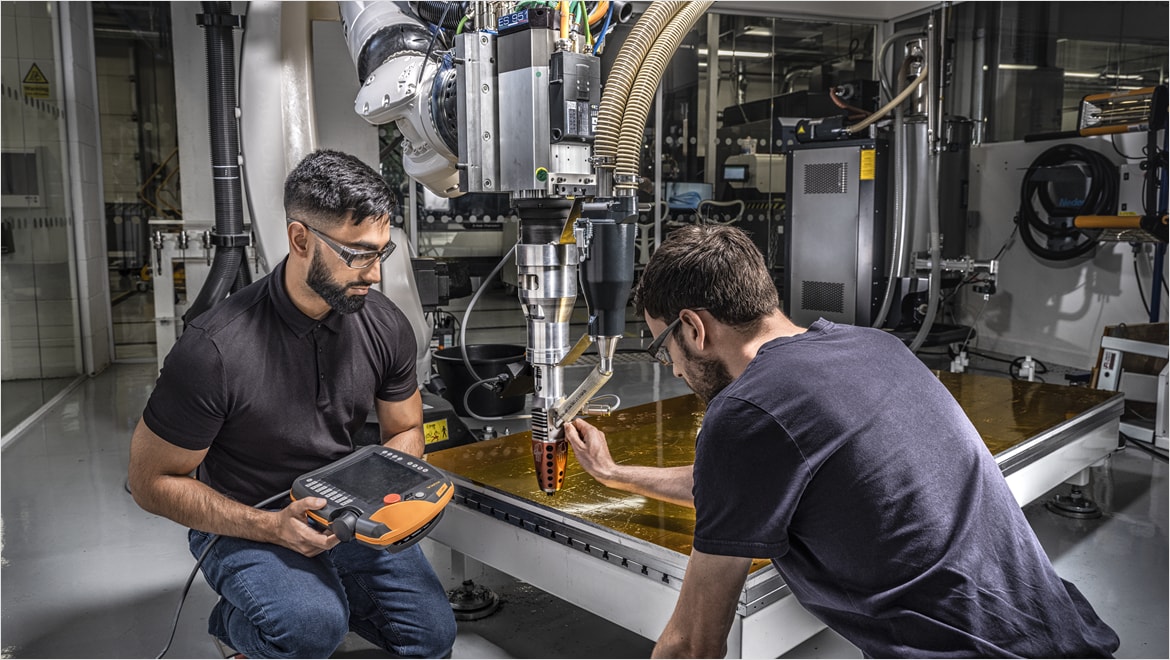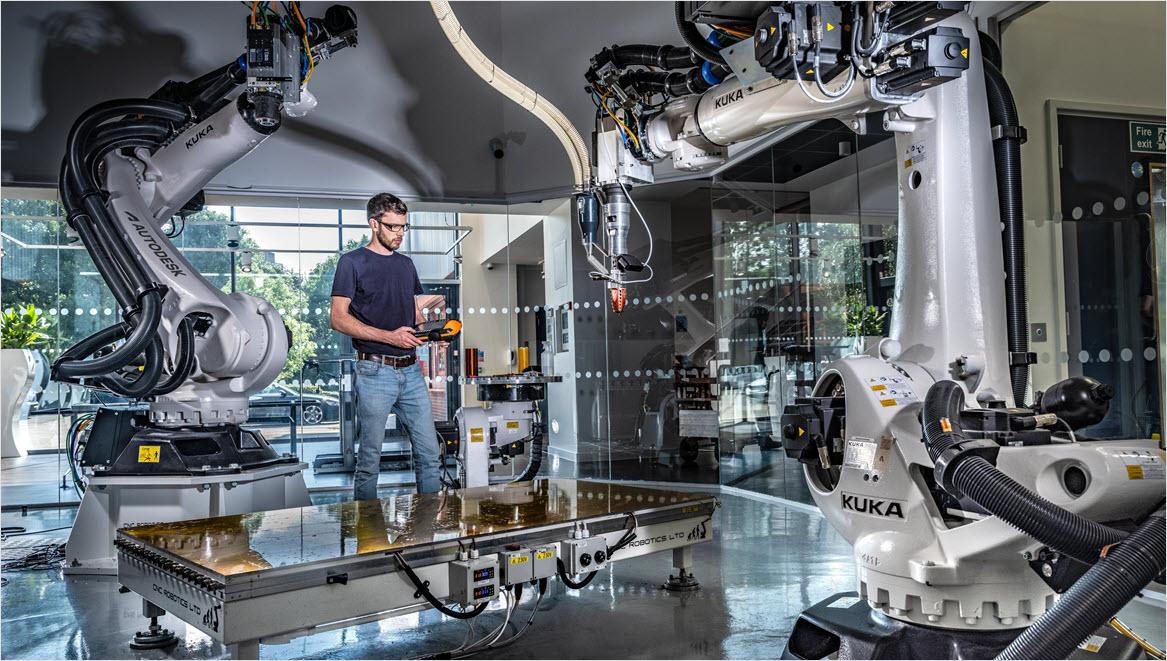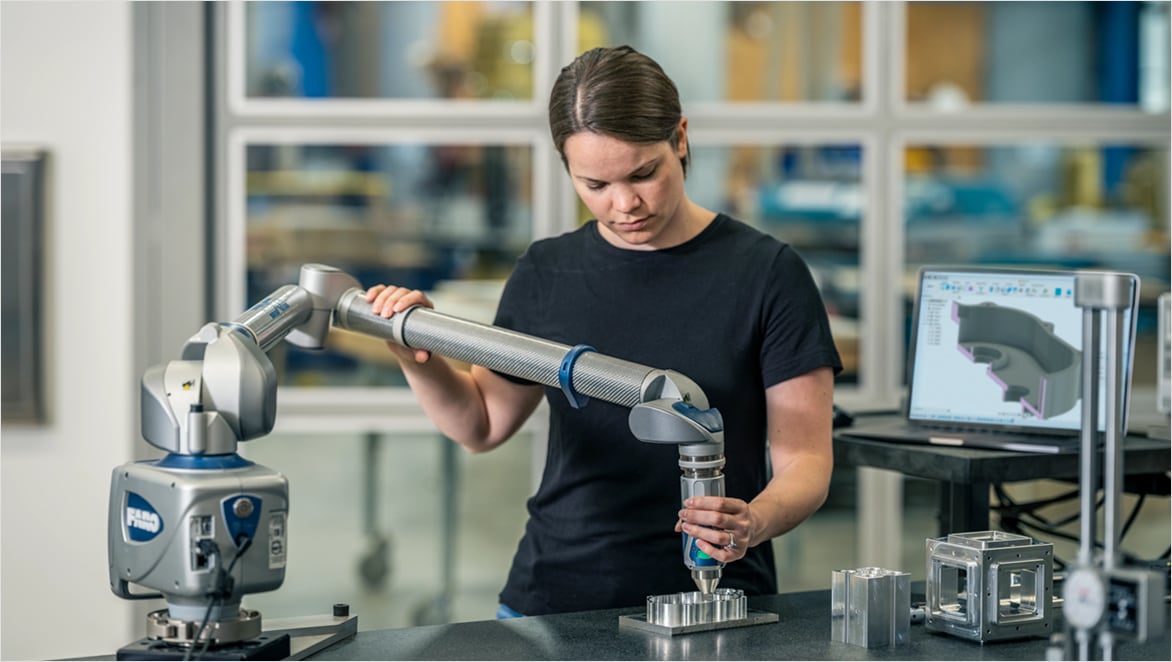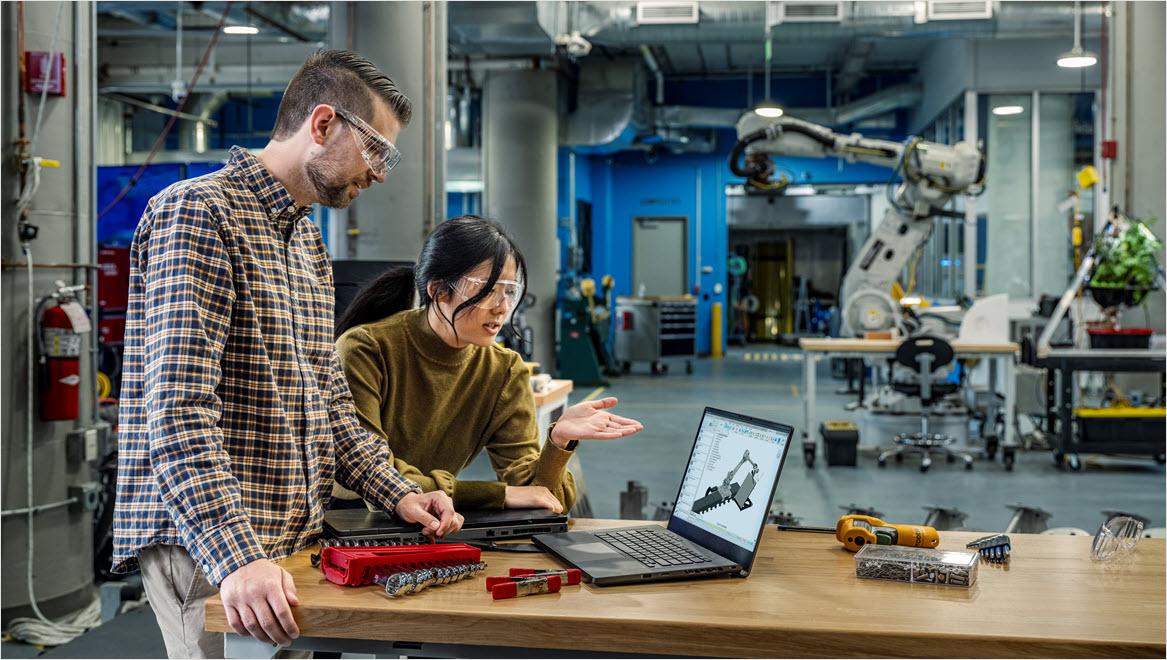& Construction

Integrated BIM tools, including Revit, AutoCAD, and Civil 3D
& Manufacturing

Professional CAD/CAM tools built on Inventor and AutoCAD
Industry 4.0, or the Fourth Industrial Revolution, integrates IoT, AI, big data, and cloud computing to revolutionize manufacturing technologies. It enables the creation of smart factories, facilitates seamless communication between machines, and enhances decision-making processes. Fusion, Autodesk's industry cloud for manufacturing, embodies these principles by providing a unified platform for design, engineering, and manufacturing.
Autodesk Fusion connects data across all stages, ensuring seamless collaboration and real-time updates, a key component of effectively leveraging Industry 4.0 for your business's growth. Fusion's robust capabilities handle large assemblies and intricate industrial designs, providing precise and efficient engineering solutions for your product development. Its connected data infrastructure enables sustainable insights, optimizing resource use, and reducing energy consumption. Integrated AI and data analytics tools enhance productivity and reduce downtime by predicting maintenance needs and improving process efficiency.
Fusion enables Industry 4.0 with advanced AI tools, process optimization, and data connectivity for manufacturing processes. It offers seamless collaboration through integration with design workspaces, team management, and extensible tools such as our partnership add-ins. Fusion provides robust solutions to analyze machine data and optimize manufacturing facilities and operations. All of this on a single platform drives digital transformation in manufacturing, enhancing efficiency, connectivity, and data-driven decision-making for better overall through put and process optimization.
Industry 4.0 helps enable the creation of smart factories where machines and systems are interconnected, allowing for real-time data exchange and seamless communication across the production floor. This facilitates predictive maintenance by monitoring equipment health and performance, thus reducing downtime and preventing costly breakdowns.
Industry 4.0 also improves manufacturing efficiency through automation and robotics. Robots or cobots, work alongside human workers to perform repetitive or dangerous tasks, resulting in improved safety and productivity. Additive manufacturing, or 3D printing, allows for rapid prototyping and the production of complex, customized components with minimal waste. This ultimatley reduces lead times and material costs.
These Industry 4.0 trends are driving significant advancements in manufacturing, making it more efficient, flexible, and responsive to changing market demands.
IIoT involves the use of interconnected sensors, devices, and systems to collect and analyze data in real-time. It also enables predictive maintenance, real-time monitoring, and automation of processes, leading to increased efficiency and reduced downtime.
AI and machine learning algorithms optimize manufacturing processes, predict equipment failures, and enhance quality control. These technologies enable intelligent decision-making, automate complex tasks, and improve overall production efficiency.
The deployment of collaborative robots (cobots) and automated systems is changing manufacturing. These robots work alongside human operators to perform repetitive or dangerous tasks with high precision, increasing productivity and safety.
3D printing technology allows manufacturers to create complex parts and prototypes quickly and cost-effectively. This trend facilitates rapid prototyping, customization, and on-demand production, reducing lead times and material waste.
Big data and analytics are driving Industry 4.0 by allowing businesses to collect and analyze vast amounts of data, while providing valuable insights that enhance decision-making efficiency. This data-driven approach helps optimize processes, predict maintenance needs, and improve product quality, ultimately leading to smarter and more efficient operations.
Cloud computing provides scalable and flexible computing resources that allow businesses to store, manage, and process data remotely. This enables real-time data access, enhances collaboration across different locations, and supports the integration of advanced technologies like IoT, AI, and big data analytics, leading to more efficient and connected industrial operations.
Cybersecurity is driving Industry 4.0 by ensuring the protection of interconnected systems, sensitive data, and intellectual property from cyber threats. As manufacutring processes become increasingly digitized and connected, robust cybersecurity measures are essential to maintain the integrity, reliability, and trustworthiness of operations, enabling the safe and secure adoption of advanced technologies.
Fusion drives productivity with advanced AI tools, enhancing throughput. It offers AI-driven insights to predict efficient toolpath creation, reduce downtime, and streamline operations. This results in higher productivity, better resource utilization, and more efficient manufacturing processes.
With advanced data analytics and connected systems, manufacturers can quickly adapt to changing market demands and customize products to meet customer requirements. This flexibility allows for mass customization and shorter development cycles, which can help companies stay competitive.
Industry 4.0 technologies enable precise monitoring and control of production processes. This results in higher quality products and reduced defects. Smart manufacturing systems can also optimize the use of materials and energy, minimizing waste and promoting sustainability.
Implementing Autodesk Fusion involves strategically integrating its core components to enhance digital workflows: Fusion for seamless CAD/CAM/CAE/PCB operations, Fusion Manage for robust lifecycle management, and Fusion Operations for real-time insights into shop floor activities.
Complemented by Autodesk Platform Services (APS), extensive APIs, professional-grade extensions, and strategic partnerships, these tools create a comprehensive digital ecosystem that supports every phase of manufacturing.
IoT, big data analytics, and AI, enhance supply chain visibility and efficiency. Real-time tracking of materials and products, predictive analytics for demand forecasting, and automated inventory management reduce lead times, minimize stockouts and overstock situations, and optimize logistics operations.
Advanced sensors, machine learning algorithms, and computer vision systems enable automated quality control in manufacturing processes. These technologies detect defects and inconsistencies in real-time, ensuring higher product quality, reducing waste, and minimizing the need for manual inspections.
Industry 4.0 enables mass customization by combining flexible manufacturing systems with advanced software and robotics. This integration allows manufacturers to produce customized products on a large scale, meeting specific customer demands while maintaining efficiency and cost-effectiveness.
The investment required for advanced technologies such as IoT devices, AI systems, robotics, and the necessary infrastructure can be substantial, making it a significant barrier for many manufacturers.
Many manufacturers operate with older, legacy systems that are not easily compatible with new Industry 4.0 technologies, leading to complex and costly integration processes.
The increased connectivity and data exchange inherent in Industry 4.0 solutions raise the risk of cyberattacks, thus robust cybersecurity measures are required to protect sensitive information and maintain operational integrity.
Implementing Industry 4.0 requires a workforce skilled in data analytics, cybersecurity, and advanced manufacturing technologies. Finding, training, and retaining employees with these specialized skills can pose a significant challenge.
18th to 19th century
The First Industrial Revolution was marked by significant advancements in mechanization through the use of water and steam power. This period witnessed a transformative shift from hand production methods to machine-based manufacturing, leading to substantial improvements in textile manufacturing and the development of iron-making techniques.
19th to early 20th century
The Second Industrial Revolution was characterized by key innovations such as electrification, assembly lines, and mass production. These advancements revolutionized manufacturing processes, leading to the emergence of major industries, including steel, oil, and electricity. Notably, Henry Ford's introduction of the assembly line fundamentally transformed automobile manufacturing, greatly enhancing production efficiency and shaping modern industrial practices.
Mid 20th century
The Third Industrial Revolution was driven by innovations in automation through electronics and information technology (IT). This era marked the integration of digital technology and automation into manufacturing, fundamentally transforming production and business processes. The advent of computers, programmable logic controllers (PLCs), and the internet played a crucial role in this transformation, enabling more efficient and sophisticated industrial operations.
Early 21st century
The Fourth Industrial Revolution is characterized by innovations such as cyber-physical systems, the Internet of Things (IoT), cloud computing, and artificial intelligence (AI). This revolution blurs the lines between the physical, digital, and biological worlds, resulting in smart factories equipped with interconnected machines, real-time data analytics, and autonomous systems. These advancements have led to enhanced customization and flexibility in manufacturing processes, transforming industrial practices on a global scale.
Industry 4.0 will continue to change manufacturing through the integration of advanced technologies such as AI, IoT, robotics, and big data analytics. The future will bring smarter, more interconnected factories with unprecedented efficiency and flexibility. Autonomous systems will enable real-time decision-making and optimization across supply chains, while advancements in machine learning and AI will enhance quality control and maintenance. The rise of 5G connectivity will make communication faster between devices, enabling sophisticated automation and remote operations.
Learn more about how AI, is enhancing smart manufacturing through predictive maintenance, real-time quality control, and supply chain optimization.
Uncover the current challenges for the factory of the future, and how to design use cases for your individual production challenges.
Learn the current challenges for the factory of the futire and how to design use cases for your individual production challenges.
Industry 4.0 helps manufacturers reduce costs, increase profits, and fuel growth. It can also make jobs better, easier, and safer, and help organizations make smarter, faster decisions.
Industry 4.0, faces several significant challenges ensuring data security and privacy, integrating new technologies with legacy systems, and managing the high initial investment costs. Additionally, addressing the skill gaps in the workforce, effectively managing vast amounts of data, and dealing with the lack of standardization are critical issues. Change management, regulatory compliance, scalability, and interoperability also pose significant hurdles. Overcoming these challenges requires strategic planning, investment in both technology and human capital, and a commitment to continuous improvement and innovation.
Industry 4.0, also known as the Fourth Industrial Revolution, encompasses a range of technologies that are transforming manufacturing and related industries. Here are some examples of Industry 4.0 technologies:
The Industrial Internet of Things (IIoT) refers to the interconnected network of industrial devices and machinery that use sensors, software, and other technologies to collect and exchange data. This data is used to monitor, control, and optimize industrial processes, leading to increased efficiency, productivity, and safety.
Industrialization 4.0, also referred to as Industry 4.0, represents the fourth major revolution in manufacturing and industry. It integrates digital technologies and advanced manufacturing techniques to create smart factories and intelligent production systems.
Industry 4.0 is transforming a wide range of industries by integrating advanced digital technologies into their processes. Manufacturing is experiencing increased efficiency through smart factories and predictive maintenance. The automotive industry is enhancing vehicle design and supply chain management with autonomous and connected cars. Healthcare benefits from improved patient care and remote monitoring through IoT and AI. The energy sector is optimizing production and distribution with smart grids and predictive maintenance. Logistics and supply chain operations are streamlined with real-time tracking and automated inventory management. Aerospace, defense, construction, and retail are also leveraging Industry 4.0 technologies to enhance innovation, efficiency, and competitiveness across their operations.



